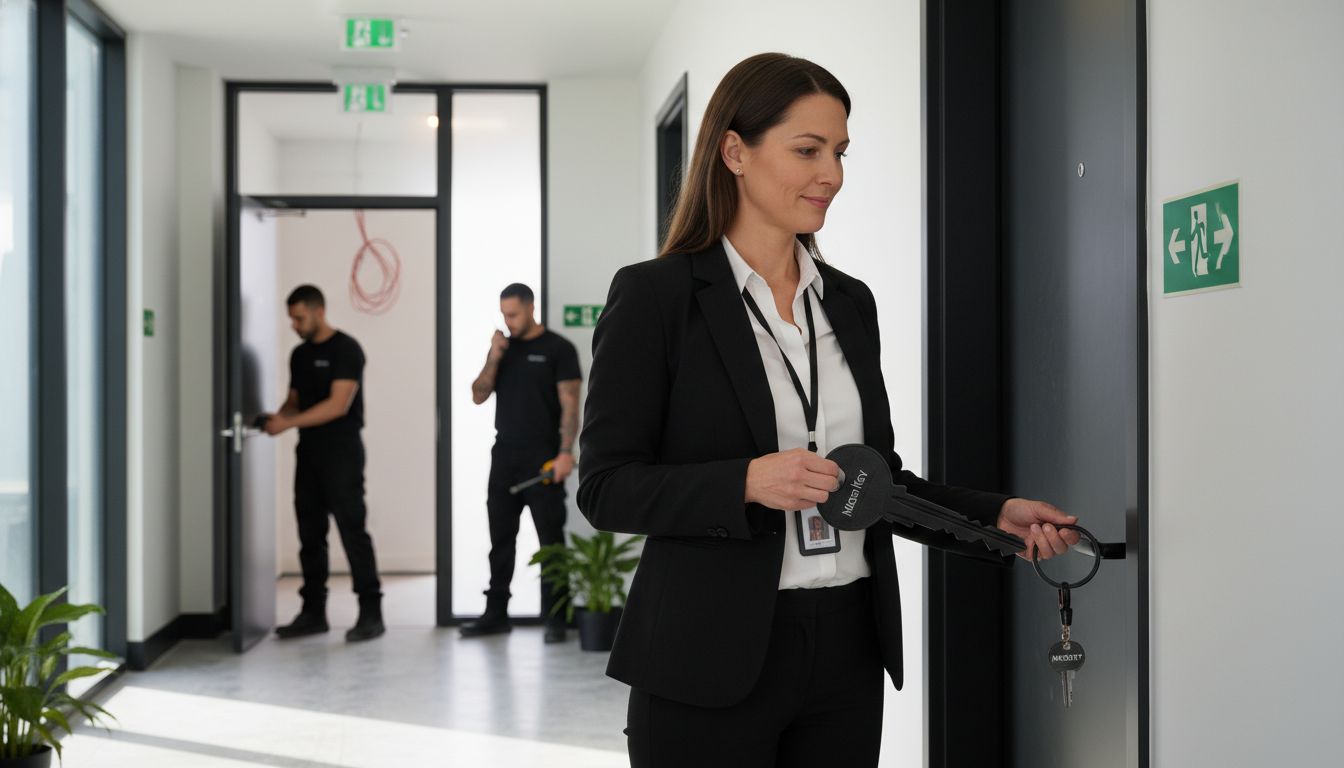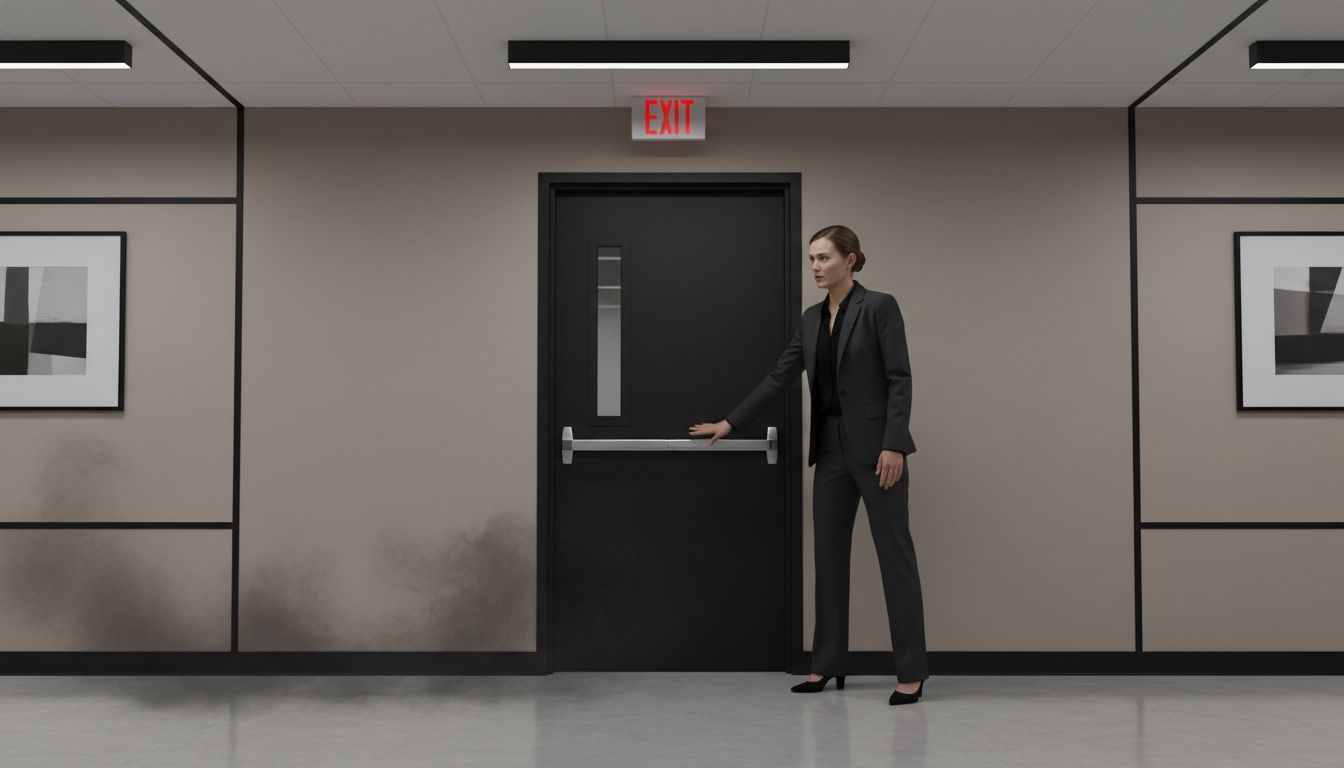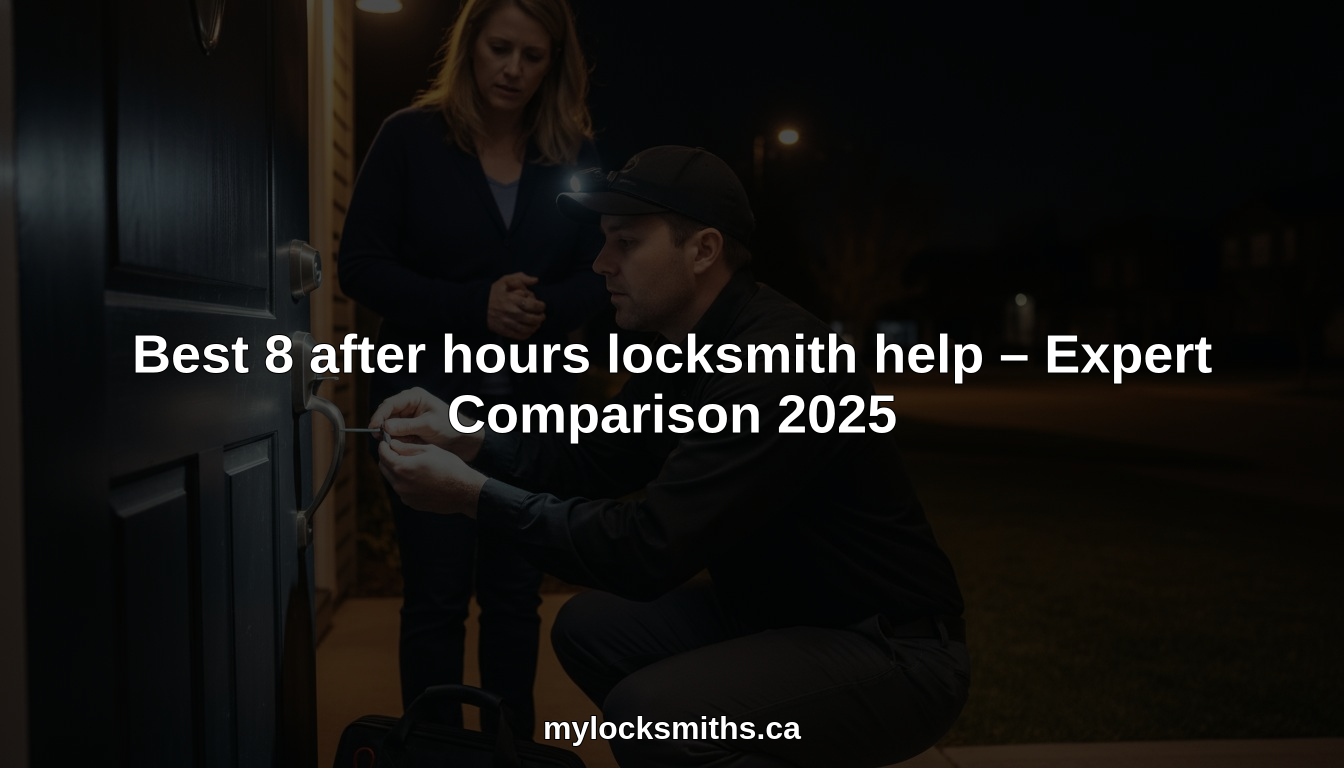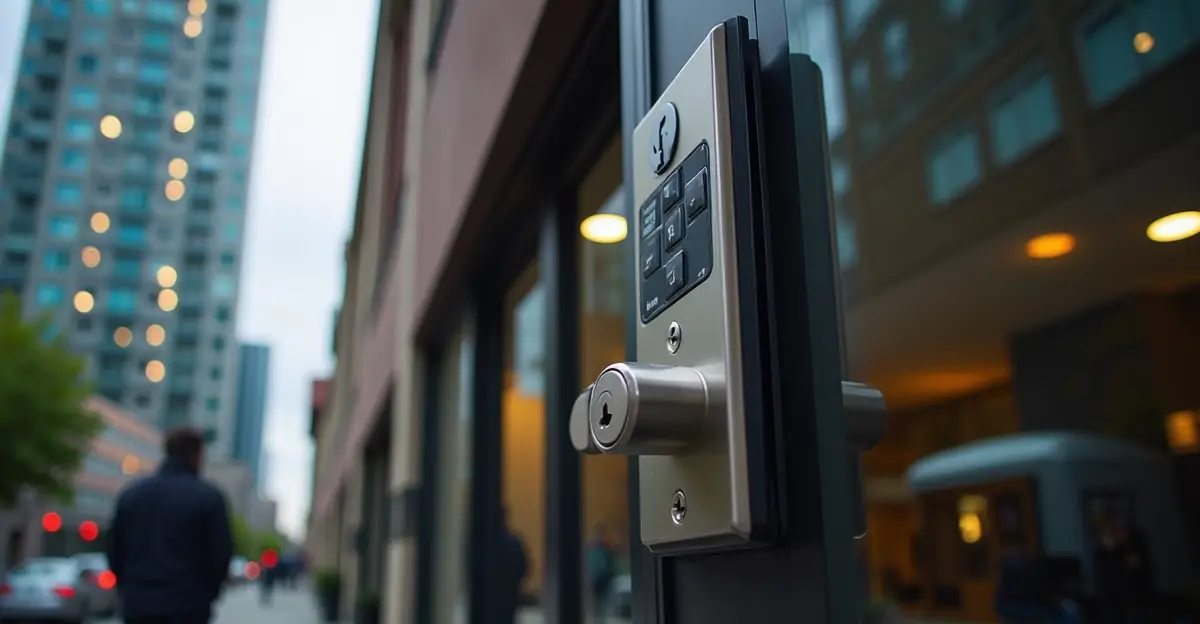Introduction
Lockouts in Etobicoke can be an incredibly disruptive experience for Brampton residents, especially when unexpected. Whether you have been locked out of your home, office, or vehicle, knowing the proper steps and key considerations is essential to regain access promptly and safely. This article provides comprehensive guidance on the methods to re-enter your property after a lockout in Etobicoke. It covers everything from assessing your situation and gathering documentation to connecting with trusted locksmith services, understanding local tenant laws, and preparing for future emergencies. By outlining each step before, during, and after a lockout, you gain valuable insights into proper remedies and long-term security measures.
The discussion begins with evaluating the lockout scenario by gathering essential documents, confirming local regulations, and contacting the appropriate authorities. Next, it explains how to find reliable locksmiths by researching credentials, checking reviews, comparing quotes, and verifying service details. The article then reviews the legal frameworks—particularly the Residential Tenancies Act—that protect tenant rights during a lockout. It also explains how to prepare for future emergencies by enhancing security measures and building a support network. Finally, the guide outlines recovery options after a lockout, including assessing damage, documenting the event for insurance, and following up with landlords.
Transitioning now to the key takeaways, here are the critical points:
Key Takeaways
- Lockouts require a methodical approach: assess the situation, gather necessary documents, and contact professional authorities.
- Reliable locksmith services are essential; researching reviews, verifying credentials, and comparing quotes ensures effective resolution.
- Understanding local laws helps tenants know their rights and the legal procedures to follow during a lockout.
- Investing in long-term security solutions, like upgraded locks and keyless entry systems, can help prevent future lockouts.
- Post-lockout recovery involves thorough documentation for insurance, communication with landlords, and community support.
Understand the Steps to Regain Entry After a Lockout in Etobicoke
Assess the Situation Before Taking Further Action
First, calmly assess your situation to determine if the lockout is caused by a lost key, mechanical failure, or security breach. Check your immediate environment to decide if it’s safe to wait for help or require emergency assistance. Look for any available alternative entry points, such as unlocked back doors or windows, without risking damage or liability. Identify the type of lock you have—whether it is a deadbolt, electronic, or smart lock—as some systems allow remote unlocking.
Review any temporary solutions provided by the manufacturer or your property management company. Quick instructions or an emergency contact may be available on the lock or in the user manual. This initial assessment helps you decide whether to call a professional locksmith immediately or address the situation on your own while also noting any additional security issues that could be present.
Gather Necessary Documentation for the Lockout
Having proper documents ready is crucial. These include your lease agreement, photo ID, and any correspondence regarding access privileges. Such documents prove your residency and ownership, and may be required by locksmiths or local authorities. Organize important paperwork and photos that illustrate the condition of your door, lock, or security systems. If you are a tenant, a signed letter from your landlord can clarify your rights during a lockout.
Keep these documents in an easily accessible digital or physical file so you can quickly present them during an emergency. This documentation is also valuable later for insurance claims or any legal disputes stemming from the incident.
Identify Local Regulations Related to Lockouts
Understanding local regulations is critical. Etobicoke has specific guidelines covering tenant rights, emergency entry, and property management responsibilities. Research the local municipal codes and the Residential Tenancies Act to know what actions are permitted during a lockout. These rules protect both tenants and property owners by dictating the necessary legal procedures during emergencies. For example, unauthorized entry may violate local statutes, and proper notice might be required before any intervention.
Being aware of these regulations helps establish a timeline for resolving the situation and prevents potential fines or penalties for non-compliance. This informed approach ensures that your actions remain within legal boundaries.
Contact Relevant Authorities for Guidance
Once you have assessed your situation and gathered the necessary documentation, contact the relevant authorities. This may include your property management company, local tenant boards, or, if a security breach is suspected, law enforcement. Clear and calm communication with these officials can result in specific recommendations tailored to your circumstances. Often, local authorities have established protocols for emergency lockouts and may even suggest approved service providers.
Prepare key questions about your legal rights, expected response times, and further recommended actions. This conversation also helps in having your documentation verified, which can speed up the process and protect you later if any disputes arise.
Keep a Record of All Correspondence During the Process
Document all communications during the lockout. Keep records of phone calls, emails, text messages, and any discussions with landlords, authorities, or locksmith services. This detailed log creates a timeline of events that is invaluable for resolving disputes, filing insurance claims, or handling legal proceedings if necessary.
Record names, dates, times, and a summary of each conversation to demonstrate that you took all reasonable steps to resolve the lockout issue. This comprehensive record helps in assessing the responsiveness of various services and guides you in refining your approach for future incidents.
Stay Informed About Your Rights as a Tenant
Being knowledgeable about your rights is crucial. Tenants in Etobicoke are protected under established laws that ensure safe and habitable living conditions. It is your right to receive clear guidelines on how to manage a lockout without incurring undue penalties or privacy breaches. Familiarize yourself with tenant rights using verified legal resources or through local community organizations specializing in housing law.
When you know your rights, you are better equipped to negotiate with landlords or service providers. For example, if a landlord delays assistance or a service provider overcharges, concrete legal knowledge empowers you to advocate for fair treatment. This understanding prepares you for future incidents and reinforces your security.
Find Reliable Services for Regaining Access in Etobicoke
Research Trusted Locksmiths Operating in Etobicoke
Finding a reliable locksmith is a critical step after a lockout. Begin by researching reputable locksmith companies in Etobicoke. Look for companies with a long-standing local presence, certified technicians, and a proven track record in emergency situations. Use local business directories, online reviews, and recommendations from neighbors to shortlist providers. Check their credentials, including licensing, insurance, and memberships in professional organizations.
A quality locksmith should be familiar with different access systems—traditional locks, smart locks, electronic keypads, and even vehicle systems—and capable of handling both residential and commercial needs. Verify that the company provides clear pricing guidelines and emergency service guarantees to ensure transparency and prompt assistance.
Check Customer Reviews to Evaluate Service Quality
Customer reviews are essential for evaluating locksmith services. Online review platforms, social media, and local forums provide real experiences about response times, professionalism, and pricing. Look for reviews that mention fast responses, accuracy of quotes, and overall satisfaction. Consistent positive feedback and high ratings indicate a reliable service.
Pay close attention to how reviewers describe handling various lock types such as deadbolts, smart keys, and electronic locks. Cross-referencing reviews from multiple sources helps build a balanced perspective, ensuring the chosen locksmith is likely to meet your needs in a stressful situation.
Request Multiple Quotes for Price Comparisons
Request quotes from multiple locksmiths to compare prices, services, and response times. Provide detailed information about your lockout situation—including the type of lock, property location, and any special circumstances—to get accurate estimates. An itemized quote clarifies what each service covers and reveals any potential hidden fees.
Comparing multiple quotes not only ensures cost efficiency but also helps identify which providers offer comprehensive services like rekeying, emergency call-outs, and follow-up maintenance. Transparency in pricing builds trust in the service provider and ensures you receive quality work without unexpected costs.
Understand What Services Are Included in Your Agreement
Before finalizing any locksmith service, make sure you understand every component of their service agreement. Ask whether the agreement includes emergency access, rekeying, total lock replacement, or additional security consultations. Ensure that the scope of service is clearly defined, including response times and any warranties provided.
Discuss with the locksmith if there are any additional charges, especially for after-hours calls, and confirm whether technical support or maintenance workshops are offered. A well-defined agreement helps prevent any misunderstandings and ensures that your specific needs are met.
Verify Their Response Time for Emergency Situations
In emergency lockout situations, a quick response is critical. Confirm the locksmith’s average response time and ask about their after-hours or weekend policies. Many reputable companies guarantee a response within 30 minutes to an hour, which is especially important during safety-sensitive hours.
Inquire if real-time tracking or communication updates are available to keep you informed during the service call. A dedicated team that responds promptly and communicates effectively reduces stress and ensures a swift resolution.
Learn About Local Laws Governing Lockouts in Etobicoke
Familiarize Yourself With the Residential Tenancies Act
Understanding the Residential Tenancies Act is crucial for any tenant facing a lockout. This act outlines the responsibilities of landlords and defines tenant rights regarding property access, repairs, and dispute resolution. Familiarity with these rules not only empowers tenants to take appropriate action but also helps ensure fair treatment during a lockout.
The Act details the steps a landlord must follow before initiating emergency entry, such as notifying the tenant and following notice guidelines. Knowing this information allows you to assess whether your landlord has followed proper procedures and what recourse you have if they have not.
Understand Your Rights as a Tenant During a Lockout
Beyond the Act, it is vital to understand your broader tenant rights during a lockout. You have the right to immediate and safe access to your home in emergencies. Understanding the conditions under which your landlord or property manager can enter your premises helps protect you from unauthorized entry.
Educate yourself through workshops, tenant rights guides, or consultations with legal advisors who specialize in housing law. With this knowledge, you can confidently negotiate with landlords and insist on proper procedures even in stressful situations.
Look Into Procedures for Legal Eviction in Ontario
While lockouts are often accidental, understanding the legal eviction process in Ontario can provide important context, especially if lockouts are used improperly to force tenants out. Legal eviction requires a strict process including proper notice and application to the Landlord and Tenant Board. Familiarity with these procedures ensures you recognize when a lockout is being misused as an eviction tactic.
Researching eviction procedures helps protect you from unethical practices and prepares you to seek legal redress if necessary.
Recognize the Importance of Proper Notice Requirements
Proper notice is fundamental in landlord-tenant interactions, particularly during lockouts. Regulations require landlords to provide explicit notice before accessing your property, ensuring transparency and fairness. If the required notice is not given, it may be grounds to challenge any action taken against you.
Keep documented evidence of any notice received and review your lease and local laws regularly. This documentation supports your case if disputes arise and ensures that all parties follow legal requirements.
Investigate Resources Available for Legal Advice
Access to professional legal advice is critical during a lockout or related disputes. Familiarize yourself with local tenant associations, legal aid clinics, and private legal practitioners who specialize in landlord-tenant law in Etobicoke and Ontario. These resources can clarify confusing legal aspects and guide you on the best course of action.
Consulting a legal professional helps ensure that your decisions—whether contacting a locksmith or negotiating with a landlord—comply with the law and safeguard your rights.
Stay Updated on Any Changes in Local Legislation
Legislation regarding tenant rights, lockouts, and landlord responsibilities often changes. Stay informed about any legislative updates or policy changes relevant to Etobicoke by following local government announcements, legal blogs, and tenant advocacy groups. This proactive approach helps you make informed decisions and ensures that your response to lockout situations remains legally compliant.
Prepare for Future Lockouts by Enhancing Your Security
Evaluate Your Current Security Measures Thoroughly
Preventing future lockouts begins with a detailed assessment of your current security systems. Check all entry points—doors, handles, and electronic systems—to ensure they function correctly and remain durable. Look for vulnerabilities such as aging deadbolts or malfunctioning electronic locks that might lead to a future lockout.
This evaluation might involve hiring a professional security consultant or using online DIY guides. Testing your smart locks or keypad entries under different conditions (like power outages) helps identify areas needing improvement.
Invest in High-Quality Locks and Security Systems
Upgrading your security equipment is a key preventive measure. Consider investing in high-quality locks that offer advanced protection, such as sophisticated deadbolts, smart locks, or keyless entry systems. These locks are designed to resist tampering and provide convenience through features like biometric access.
Modern security systems often integrate with mobile devices, allowing you remote control and monitoring. Although the initial cost may be higher, the long-term benefits—enhanced security, lower emergency costs, and increased property value—make the investment worthwhile.
Consider a Keyless Entry System for Convenience
Keyless entry systems provide a modern solution to traditional locks by eliminating the risk of lost or stolen keys. These systems allow entry using a password, smartphone, or biometric data, and can generate temporary access codes for trusted individuals. This added convenience is especially beneficial in emergency situations.
Keyless systems also reduce human error and provide secure audit trails of entry history, offering both enhanced security and easier tracking.
Share Access Information With Trusted Neighbors or Friends
Developing a community-based security strategy can be highly effective. Sharing spare keys or secure access details with trusted neighbors or friends ensures that you have a backup plan during emergencies. Such support networks can expedite access in a lockout while fostering a sense of collaboration and mutual assistance.
When sharing access information, use secure methods and keep an updated record of who is involved. This simple precaution further strengthens the overall security of your home.
Regularly Change Your Locks in Case of Lost Keys
Regular maintenance of your locks is essential for long-term security. Changing or rekeying your locks after a lost key or suspected unauthorized duplication minimizes the risk of further breaches. Incorporate regular lock maintenance into your home upkeep routine to preempt future lockouts.
Professional locksmiths can advise whether a simple rekey or full lock replacement is necessary. Keeping records of these changes also ensures clarity for any future service needs or disputes.
Keep Spare Keys Hidden Safely Outside Your Property
Having spare keys readily available is a traditional but effective strategy. However, it is important to store them securely to avoid theft or unauthorized use. Options such as a high-quality lockbox with a combination code, or entrusting a spare key to a trusted neighbor, offer both accessibility and security.
Regularly inspect the chosen storage method to ensure its integrity, helping you avoid prolonged lockout situations when emergencies occur.
Seek Support and Resources After a Lockout Experience
Connect With Local Community Support Services
After a lockout, connecting with local community support services can provide both practical and emotional assistance. Many Etobicoke communities have tenant groups, social services, and housing support organizations that offer guidance during difficult times. Sharing your experience and seeking advice from these groups may reveal helpful strategies and boost your overall preparedness.
These services often offer additional resources, from temporary housing support to legal advice. Tap into this network to enhance your recovery and learn effective safety measures.
Explore Financial Assistance Options if Required
Unexpected expenses during a lockout can be challenging. Financial assistance is sometimes available through municipal aid programs, emergency relief funds, or low-interest loans offered by community organizations. Contact local authorities or charitable organizations for help if you face significant out-of-pocket costs.
Additionally, review your insurance policy to determine if emergency locksmith services or property repairs are covered. Multiple financial support avenues can help manage the economic impact of an emergency.
Utilize Counseling Resources for Emotional Support
Lockouts can cause considerable stress and anxiety. Accessing counseling or mental health resources can be an important part of your recovery. Local health centers, community organizations, and even employer-sponsored programs may offer therapy sessions, support groups, or crisis hotlines to help manage stress during and after a lockout.
Professional counseling not only provides coping strategies for the immediate crisis but also helps build long-term resilience and prepares you for future emergencies.
Consider Joining Local Tenant Associations for Guidance
Local tenant associations are valuable for navigating housing challenges, including lockouts. By joining these groups, you gain access to a wealth of knowledge on tenant rights, emergency procedures, and dispute resolution. Associations often hold regular meetings and update members on legislative changes, ensuring that you stay informed about your rights.
Participation in these groups also provides collective support during disputes with landlords and creates a platform for sharing practical advice and trusted service recommendations.
Share Your Experience to Help Others in Similar Situations
Your personal experience can be a powerful resource for others facing similar challenges. Sharing your journey—from the initial lockout to recovery—via online forums, community meetings, or social media can offer practical insights and reassurance to fellow tenants. Personal testimonials help build a community of support and demonstrate that effective solutions do exist.
Documenting your experience also enables you to reflect on what worked well and identify areas for improvement, contributing to a broader safety network in your community.
Record Lessons Learned for Future Reference
After a lockout, recording your lessons learned is essential for better preparedness. Keep a detailed log of the actions taken, including response times, service efficiency, and overall effectiveness of the resolution. This record serves as a reference guide for improving your emergency strategy.
Sharing these lessons with family members or neighbors can also build a collective approach to handling future lockouts, ensuring that everyone benefits from your experience.
Evaluate Recovery Options Post-Lockout Incident
Assess Any Damage or Losses Incurred During the Lockout
Once you regain access, inspect your property for any damage caused by the lockout—whether from forced entry or exposure to weather elements. Document all damages with clear photographs, detailed notes, and cost estimates for repairs. This record is important when filing insurance claims or discussing repairs with your landlord.
A thorough damage assessment not only clarifies the financial impact but also helps you take corrective measures promptly to prevent future issues.
Document Any Event for Insurance Purposes
Following a lockout, document every detail of the incident for insurance purposes. Record a detailed description, save receipts from locksmith services, and maintain all correspondence with service providers and property managers. Organized documentation, including photographs and written logs, can be crucial if you need to file an insurance claim or pursue legal action.
Systematic recordkeeping strengthens your case for reimbursement and protects your financial interests.
Explore Claim Options Under Your Insurance Policy
Review your insurance policy to understand what coverage is available for emergency locksmith services, property damage, or additional living expenses in case your home is inaccessible for a period. Contact your insurer to discuss the incident, confirm the claim process, and gather any required documentation. This proactive approach helps ensure that you are fully compensated for any expenses incurred.
Schedule a Follow-Up With Landlords or Property Managers
After resolving a lockout, it is important to meet with your landlord or property manager to review the incident. Discuss any damages, evaluate current security measures, and negotiate necessary repairs or upgrades to prevent future incidents. A follow-up meeting creates a record of the incident and helps establish improved protocols for emergency access in the future.
Collaborative discussions contribute to clearer communication and better security measures between tenants and property managers.
Discuss Preventative Strategies With Your Community
Engage your community in discussions about how to prevent future lockouts. Whether through neighborhood meetings or tenant associations, sharing experiences and strategies can yield collective benefits. Community discussions can lead to shared recommendations for trusted locksmiths, effective security upgrades, and coordinated emergency procedures that improve overall neighborhood safety.
A collaborative approach strengthens community resilience and empowers residents to take proactive steps.
Keep an Ongoing Dialogue About Tenant Rights in Etobicoke
Maintaining a continuous conversation about tenant rights is vital for long-term security and effective dispute resolution. Regularly engage with legal advisors and tenant associations to stay updated on current legislation and best practices. Open forums and workshops can provide fresh insights and ensure that all parties—tenants, landlords, and service providers—remain informed and compliant with evolving legal standards.
This ongoing dialogue fosters a transparent environment and reinforces the rights and responsibilities of all parties in a lockout situation.
Table: Comparison of Locksmith Service Factors in Etobicoke
Before proceeding further, review the following table summarizing the key factors when choosing a locksmith service:
| Factor | Description | Importance Level | Typical Response Time | Certification Required | Insurance Verification | Customer Review Focus |
|---|---|---|---|---|---|---|
| Service Reputation | Longevity and local praise through reviews | High | Within 30 minutes | Yes | Yes | Consistently positive |
| Pricing Transparency | Clear, itemized costs and competitive quotes | High | Varies by location | Yes | Yes | 4+ stars on reviews |
| Emergency Response Efficiency | Speed and reliability in emergency services | Critical | Under 1 hour | Mandatory | Mandatory | Fast response reviews |
| Technological Competence | Familiarity with smart locks, keyless entries | High | Quick diagnostic | Certification required | Yes | Favorable ratings |
| Comprehensive Services | Includes rekeying, repair, and consultations | High | Within agreed timeframe | Yes | Yes | Consistent referrals |
| Credentials & Insurance | Verified professional licenses & insurance | Critical | Immediate verification | Verified | Verified | Trustworthy feedback |
| Local Experience | In-depth knowledge of Etobicoke-specific issues | High | Prompt service | Yes | Yes | Local expertise noted |
Table: Legal Considerations and Tenant Rights Checklist
Below is a checklist outlining key legal considerations and tenant rights:
| Consideration | Description | Applicable Legislation | Tenant Benefit | Recommended Action | Documentation Needed | Local Advisory Source |
|---|---|---|---|---|---|---|
| Residential Tenancies Act | Outlines rights for property access | Ontario Residential Act | Ensures safe, livable conditions | Review Act regularly | Lease agreements, notices | Local tenant associations |
| Proper Notice Requirements | Notice periods for landlord entry or eviction | Ontario laws | Fair and timely communication | Insist on written notice | Official notices, emails | Legal aid clinics |
| Legal Eviction Procedures | Process for legal eviction and re-entry protocols | Landlord-Tenant Board | Protection from unethical practices | Consult legal counsel | Eviction records, hearing documents | Tenant advocacy groups |
| Security Deposits & Reimbursement | Covers damages incurred during lockouts | Local legislation | Financial protection | Maintain detailed records | Payment receipts, repair estimates | Local housing ministry |
| Insurance Claims for Emergencies | Policy details for emergency locksmith services | Insurance policy terms | Monetary compensation access | File claims promptly | Photos, receipts, incident log | Insurance agent |
| Tenant Support Services | Availability of legal and community support | Municipal guidelines | Access to expert assistance | Contact local support | Service brochures, websites | Community centers |
| Ongoing Legal Updates | Regular updates on changing tenant rights | Legislative updates | Informed decision-making | Join tenant associations | Newsletters, legal updates | Local government websites |
Table: Security Enhancements and Preventative Measures Comparison
Review this table to compare various security enhancements:
| Security Measure | Key Benefit | Implementation Cost | Longevity (Years) | Maintenance Required | Suitable For | Recommended Frequency |
|---|---|---|---|---|---|---|
| High-Quality Deadbolt | Improved resistance to forced entry | Medium | 10-15 | Low | Residential homes | Every 5-10 years |
| Smart Lock System | Keyless entry & remote monitoring | High | 8-12 | Moderate | Urban residences, offices | Annual software update |
| Keyless Entry with Biometric | Enhanced security with fingerprint access | High | 10 | Moderate | High-risk areas | Every 2-3 years |
| Rekeying Services | Updates security without full replacement | Low | Varies | Low | Rental properties | Annually or after key loss |
| Secure Key Lockbox | Safe storage for spare keys | Low | 5-10 | Low | All property types | Inspect every 6 months |
| Video Surveillance Systems | Real-time monitoring & deterrence | Medium to High | 5-8 | Moderate | High security areas | Check monthly |
| Alarm and Monitoring Systems | Immediate forced entry notifications | Medium | 10 | Moderate | All properties | Test monthly |
Final Thoughts
Regaining entry after a lockout in Etobicoke requires a clear understanding and proactive measures. By following these step-by-step guidelines—from assessing your current situation, gathering vital documents, and verifying locksmith credentials, to understanding local laws and enhancing your security—you can minimize risks and prepare effectively against future emergencies. With proper documentation, legal awareness, and community support, you ensure not only immediate resolution but also a long-term strategy for better household security and peace of mind.
Frequently Asked Questions
Q: What is the first step to take when locked out in Etobicoke? A: Begin by calmly assessing your situation to determine if the lockout is due to a lost key, mechanical failure, or a security breach. Check for alternative entry points and evaluate the type of lock involved. This initial assessment helps decide whether you need to call a professional locksmith or take other measures immediately.
Q: How do I know if a locksmith in Etobicoke is reliable? A: Reliable locksmiths are identified through online reviews, verified certifications, and insurance. Research local companies, request multiple quotes, and ensure they are experienced with various locking systems—from traditional deadbolts to smart locks—to provide comprehensive service during an emergency.
Q: What legal rights do tenants have during a lockout? A: Tenants are protected under the Residential Tenancies Act and local laws, which guarantee safe and habitable living conditions. These laws ensure that you have the right to immediate access to your home and proper notice from your landlord before any emergency entry occurs. Reviewing your lease and local regulations helps you understand and enforce your rights.
Q: What measures can I take to prevent future lockouts? A: Preventative measures include investing in high-quality locks and security systems, considering keyless entry or biometric options, and securely storing spare keys outside your property. Regularly assessing and updating your security measures and sharing access information with trusted neighbors can significantly reduce the risk of future lockouts.
Q: How can I explore insurance options after a lockout incident? A: Once you resolve a lockout, document all damages with detailed notes and photographs, then review your insurance policy to see if emergency locksmith services or property damage are covered. Contact your insurer to discuss the claim process and ensure reimbursement for any incurred expenses.
Q: What should I do if my landlord does not provide proper notice before a lockout? A: If your landlord fails to provide the legally required notice, document all communications and details of the incident. Seek legal advice from tenant associations or legal aid services to assert your rights and negotiate a remedy. Accurate records will support your case in any dispute resolution or legal action.
Q: Where can I find additional support or legal advice regarding lockout situations? A: Additional support is available through local community support services, tenant associations, legal aid clinics, and government websites dedicated to housing rights in Etobicoke. These resources offer guidance, counseling, and professional assistance to help you navigate both immediate and long-term challenges associated with lockouts.







